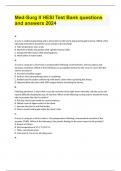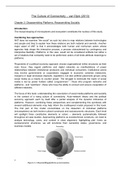Exam (elaborations)
Med-Surg II HESI Test Bank questions and answers 2024
- Course
- Institution
Med-Surg II HESI Test Bank questions and answers 2024 A. A nurse is reinforcing teaching with a client who has HIV and is being discharged to home. Which of the following instructions should the nurse include in the teaching? A. Take temperature once a day. B. Wash the armpits and genitals ...
[Show more]




